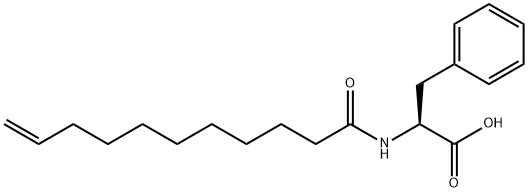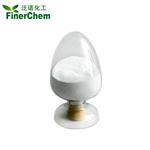Description
Undecylenoyl Phenylalanine is a chemical compound—a substituted amino acid derivative—that is used in skin conditioning agents in different brands of whitening creams and other skin care topical products. The compound helps regulate skin pigmentation, thereby, improving skin tone and its fairness.
Undecylenoyl phenylalanine is a possible antagonist of alpha-melanocyte-stimulatinghormone. It inhibits melanotropin, a melanin stimulator found in the skin. Melanotropin controls tyrosinase activity (tyrosinase being an essential enzyme in the production of melanin), melanin (eumalanin) synthesis and melanosome; therefore, by preventing the production of melanotropin, the pigmentation process is reduced or halted.
Uses
Undecylenoyl phenylalanine is a novel skin-lightening agent, probably acting as α-melanocyte-stimulating hormone (α-MSH) and beta-adrenergic receptor (β-ADR) antagonist.
benefits
Undecylenoyl Phenylalanine has good skin affinity and can control the binding of α-MSH (melanocyte-stimulating hormone) to melanin production factors, thus blocking the process of melanin formation. It can exert a blocking effect on α-MSH at a concentration of 0.001%, while the optimal use concentration is 1%. It can comprehensively inhibit melanin production at multiple levels, resulting in more significant and long-lasting effects.
Clinical Use
A study was done to evaluate the efficacy and safety of a preparation containing undecylenoyl phenylalanine 2% in the topical treatment of solar lentigines. In total, 36 patients with solar lentigines of the hands were randomly assigned to apply the active preparation on one side and the vehicle alone on the other side, twice daily for 12 weeks. Undecylenoyl phenylalanine 2% is a novel depigmenting agent, which possibly acts as an alpha-melanocyte-stimulating hormone antagonist, thus inhibiting melaninogenesis. It achieved a significant lightening of the lesions with minimal side-effects. Most patients were satisfied with the improvement.
Side effects
When taken by mouth: L-phenylalanine is LIKELY SAFE for most people when taken in amounts commonly found in foods. L-phenylalanine is POSSIBLY SAFE when taken as medicine, short-term. D-phenylalanine is POSSIBLY SAFE when used as a single dose of up to 10 grams. There isn't enough reliable information to know if D-phenylalanine is safe when used as more than a single dose.
Mode of action
Undecylenoyl Phenylalanine is a structural analogue of α-MSH that competitively binds to the melanocortin-1 receptor (MC1-R) on melanocytes, leading to the suppression of melanocyte activity and reduced melanin production by inhibiting the production of tyrosinase.



